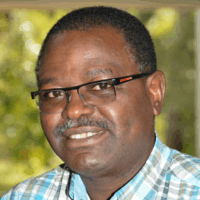Keynote Speakers
|
Date & Time |
Location |
Session |
Speaker |
Streamed to |
|
26.06.2025 – Thursday |
Hall 131 |
Keynote speech |
Francis Nyamnjoh |
Hall 200 (FA), Hall 300 (FA), Great hall (MLP) |
|
11:15 – 13:00 |
||||
|
26.06.2025 – Thursday |
Hall 131 |
Keynote speech |
Fatuma Ahmed Ali |
Hall 200 (FA), Hall 300 (FA), Small hall (MLP) |
|
17:15 – 18:30 |
||||
|
27.06.2025 – Friday |
Hall 131 |
Keynote speech |
Margaret Amaka Ohia-Nowak |
Hall 200 (FA), Hall 300 (FA), Great hall (MLP) |
|
11:30 – 12:45 |

Francis B. Nyamnjoh
Being and Becoming African in a Nimble-Footed World
Short bio: Francis B. Nyamnjoh, a B1-rated Professor at the University of Cape Town, is a leading African Studies and Social Anthropology scholar. His work, focused on media, mobility, and belonging, employs “incompleteness” and “conviviality” as key lenses. An International Fellow of the British Academy (2024), he is award-winning in both creative writing and social anthropology. His influential scholarship, including works like #RhodesMustFall:Nibbling at Resilient Colonialism in South Africa (2016) and Incompleteness: Donald Trump, Populism and Citizenship (2022), delves into contemporary citizenship and identity, reflecting his profound engagement with African social dynamics.
Abstract: This lecture explores African identity through the lens of incompleteness and motion. By challenging the traditional nation-state-centric view of belonging, it offers a nuanced framework for analysing diasporic cultural production. This framework acknowledges the complex realities of individuals with multi-layered identities shaped by interconnected geographies and hierarchies at both local and global levels. The discussion expands the concept of diaspora beyond the confines of nation-states, recognising the multiplicity of “homes” and “dislocations” in the contemporary world. It highlights how ongoing conflicts and liberation struggles blur the lines between home and diaspora, demonstrating the fluidity of belonging in an ever-shifting global landscape. Ultimately, the lecture encourages a critical reassessment of diasporic experiences and emphasises the interconnectedness of “frontier homes” and “frontier diasporas” within and beyond the nation-state.

Fatuma Ahmed Ali
Afropolitanism, Islam, Gender, and the Post 9/11 World Through Ali Mazrui’s Triple Heritage: The Case of African Muslim Women in Academia
Short bio: Associate Professor of International Relations at the United States International University (USIU)-Africa and a visiting faculty member at the Universitat Jaume I, Spain. She is an Associate Fellow at the Horn Institute, Kenya, and serves as a Gender Advisor for the Somali Women’s Study Centre. Dr. Ali also chairs the board of the Coalition of Violence Against Women (COVAW) and Conscious Kenya and is a member of the Advisory Board at the Austrian Centre for Peace. Her research interests include gender analysis, the politics of peace and security in the Horn of Africa, gender and violent extremism; informal peacebuilding, gender and labour migration, diaspora returnees, and women’s agency in regime change. She is also developing interests in the Horn-Gulf relations, the politics of stigmatized bodies, gender equality, disability and social Inclusion in the borderlands, gender analysis of the Blue Economy, and women’s digital financial inclusion. Dr. Ali has contributed to peer-reviewed journals, book chapters, opinion pieces, authored and co-edited books in both English and Spanish. In June 2023, she co-edited a special issue on Gender and Violent Extremism for the Journal of British Academy. She has received multiple grants and was awarded the prestigious Peace Prize 2020 from the City of Castellon, Spain.
Abstract: In this lecture, I will explore the intersections of Afropolitanism, Islam, gender, and the post-9/11 world through Ali Mazrui’s concept of the Triple Heritage focusing on African Muslim women in academia. In an increasingly securitised post 9/11 world marked by racialised Islamophobia and systemic barriers within academia, the lecture will examine how African Muslim women’s lived experiences are shaped by overlapping layers of identity including religious, cultural, and gendered dimensions. As a framework to understand this complexity, Mazrui’s concept of Triple Heritage is applied as it argues that African identity is shaped by three major influences, such as indigenous African tradition, Islamic civilization, and Western colonial legacies. Furthermore, Mazrui’s Triple Heritage aligns with Afropolitanism as a concept that celebrates African identities hybridised and globalised, despite remaining grounded in African heritage. However, that pushes against the reductive stereotypes of Africa meanwhile opening up more platforms for nuanced engagement with Islam and gender. The lecture concludes by arguing that African Muslim women in academia exemplify the hybridity celebrated in Afropolitanism, blending their cultural, religious, and academic identities to challenge stereotypes and advocate for inclusivity in knowledge production.

Johny Pitts
Afropea: An Imaginative Map
Short bio: Johny Pitts is a writer and photographer from Sheffield. He is the author of Afropean: Notes from Black Europe (Penguin), which is currently translated into 9 languages, and won the Jhalak Prize, the European Essay Prize, the Leipzig Book Award for European Understanding and the Bread and Roses Award for Radical Publishing. Afropean: A Journal (Mörel) is a bespoke art book, bringing together photographs, notes and ephemera from the same body of work, and is a Wired, PHMuseum, 1000Words Mag and PhotobookStore Book of the year.
Home is not a Place, a collaboration with TS Eliot prize winning poet Roger Robinson, was a Waterstones and Guardian book of the year and shortlisted for a British Book Award. Johny has written and photographed for The Guardian, The New York Times, The British Journal of Photography, Conde Nast Traveller and Dazed & Confused amongst others, and is a National Geographic Explorer. He has held exhibitions at Foam Gallery Amsterdam, The Museum of Contemporary Photography in Chicago and The Photographers Gallery London and is the curator of After the End of History: British Working Class Photography 1989- 2024 for Hayward Gallery Touring. His work is held in the permanent collection at the Victoria & Albert Museum, London. As a broadcaster, he has written and presented various documentaries for the BBC, and presented Radio 4’s flagship literature show Open Book between 2020 and 2024.
Johny holds British and US Passports, is a member of the European Institute Advisory Board at UCL and a European Young Leader. He has lectured at The Universities of Oxford and Cambridge, The London School of Economics, and served as the 20th Friedrich Dürrenmatt Guest Professor at the University of Bern, Switzerland. In 2025 he received the EM Forster Award from the American Academy of Arts and Letters, and a Daiwa Anglo-Japanese Foundation scholarship.
Abstract: During an era of cultural and geopolitical fractures, how can Black communities in Europe form resilient cross-border connections and solidarities? Drawing upon underrepresented histories in order to suggest alternative futures, Johny Pitts will present a keynote speech bringing together 15 years of on the ground travels and research, which culminated in his award-winning book Afropean: Notes from Black Europe will suggest a theoretical framework for scholars, artists and writers.

Margaret Amaka Ohia-Nowak
Afro-Poland: language, discourse and Blackness
Short bio: Dr Margaret Amaka Ohia-Nowak holds a PhD in Linguistics and an MA in Cultural Studies. She is an Assistant Professor at the Institute of Communication and Media Studies at Maria Curie-Skłodowska University in Lublin (Poland). She is also a faculty member of the Women’s and Gender Studies Programme at the University of Łódź and of the Black Europe Summer School in Amsterdam. As a linguist and media scholar, her research combines critical discourse studies, sociolinguistics, and pragmatics. She focuses her work on race and racism in public and private communications in Poland, anti-Black racist discourse, and the media representation of Black Africans in Poland. She is the author of the book Antyczarny rasizm. Język-dyskurs-komunikacja” (2025). Margaret was a Fulbright Scholar at the University of California, Berkeley. She graduated from the Obama Foundation Leaders Programme (2024–25) and is the recipient of both the Emma Goldman Award (2025) and the Susan Treadwell Memorial Award (2024). She is a co-founder and a co-director of the Black Justice Poland Foundation and a board member of the Black Europe Foundation and the Journal for Right-Wing Studies (JRWS).
Abstract: This keynote lecture critically examines the multimodal construction of race, Africanness and Blackness in Poland, a predominantly white nation with no direct colonial ties to Africa. It critically analyses linguistic, discursive and visual representations, focusing on the evolution and contested semantics of Polish ethnonyms for Black Africans and Afro-descendants (e.g. ‘Murzyn’, ‘Mulat’, ‘czarny’, ‘Afropolak’), and how these representations intersect with Black Afro-Polish identities. Through the linguistic and visual analysis of media and educational discourse, the lecture reveals how these channels perpetuate anti-Black racism and discriminatory narratives that profoundly impact the lived experiences of Black individuals in Poland. Through ethnographic interviews, particularly those with Black Polish woman, and media analysis, the lecture argues that Poland has adopted Western colonial ideologies and anti-Blackness. These ideologies are evident in various cultural sources, including literature, film, advertisements, curricula, political rhetoric and everyday language. The lecture challenges the idea of Polish racial innocence, demonstrating how global racial hierarchies and illiberal populist narratives influence the racial imagination and intersectional experiences of Afro-Polish individuals. This contributes significantly to our understanding of race in Central and Eastern Europe.

